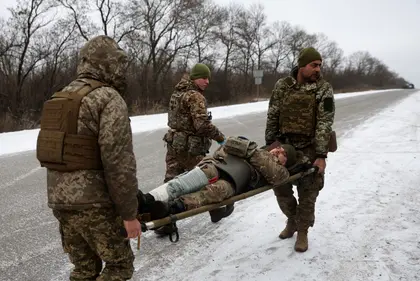 Polish volunteer Damian Duda (right) and his colleague in Soledar on Jan. 2. Photo credit: W międzyczasie Facebook page.
Polish volunteer Damian Duda (right) and his colleague in Soledar on Jan. 2. Photo credit: W międzyczasie Facebook page.
“It is not just Ukraine's war,” says Polish volunteer Damian Duda, explaining what motivates him to risk his life to help troops battling against Russia in Soledar.
JOIN US ON TELEGRAM
Follow our coverage of the war on the @Kyivpost_official.
“It is a war between the civilization of death and the civilization of life."
Fighting in Soledar in eastern Ukraine has raged for weeks now, with Russia last week declaring victory and Ukraine insisting the battle is still not over. Both sides have suffered huge losses.
Despite being one of the most dangerous places on the planet right now, small numbers of volunteers still feel compelled to travel there and help as best they can.
Duda is one of a team of five Polish volunteers who recently spent eight days treating and evacuating injured Ukrainian soldiers taking part in the unrelenting battle.
"We work as paramedics on a volunteer basis in Soledar,” he tells Kyiv Post. “We take soldiers wounded on the front line, stabilize their condition, transport them to a safe place in a special armored vehicle, and then take them to a stabilization point in an ambulance.”
Duda says he sometimes sees up to 50 soldiers a day, referring to the situation as “very difficult.” He describes how, on one particular day, he came across “wounds from artillery and close combat, small arms, and many amputation cases.”

Latest on Russia’s Intransigence to End War Against Ukraine
The Russian command continues to concentrate significant forces along the Bakhmut front, where Soledar is located. According to the latest information from the Command of the Armed Forces of Ukraine (AFU), Ukrainian defense forces continue to hold the defense in the city.

Polish volunteer saving a Ukrainian serviceman in Soledar on Jan. 10. Photo credit: W międzyczasie Facebook page.
No stranger to war
Duda is used to the risks of dangerous volunteering, having first come to eastern Ukraine back in 2014, albeit for a very different reason.
At the time there was a great deal of Russian propaganda in Poland, and Duda wanted to see for himself whether there really were Nazis in Ukraine.
"In Mariupol, I met fighters of the Azov Battalion and realized that there were no Nazis, and that it was all Russian disinformation. On the contrary, I saw that the separatists were members of the Russian army," Duda says.
Duda returned to Poland after that, gathered together a crew of volunteers, and then went to provide medical assistance on the front line.
When the full-scale invasion began, Duda and his volunteer friends grabbed their backpacks, got into their vehicle and came to help.
In the early days of the full-scale war, they worked with the 26th Territorial Defense Battalion of Kyiv, and stood together with this battalion at a checkpoint near Kherson until the city was liberated. The next destination for Duda and his team was Donbas.
"We have a small team of five volunteers, but I know that other Polish crews also help.”
Duda and his team plan to form a medical battalion of medical workers in Poland to work in Ukraine.
“I do not know what will happen in Soledar, it will not be easy to hold on to the city, but my crew will definitely work there," Duda added.
Duda is full of praise for the soldiers he comes across during his work.
"We worked there with the 46th Airborne Brigade; for me, it is the best team as I know how they fight,” he says.
“They have one woman – a paramedic surgeon by the name of Daryna. She is great. Our team will continue to work with them.
“I want to appeal to all Ukrainians and President Volodymyr Zelensky. The 46th Brigade are heroes and everyone must know this.”
You can also highlight the text and press Ctrl + Enter










